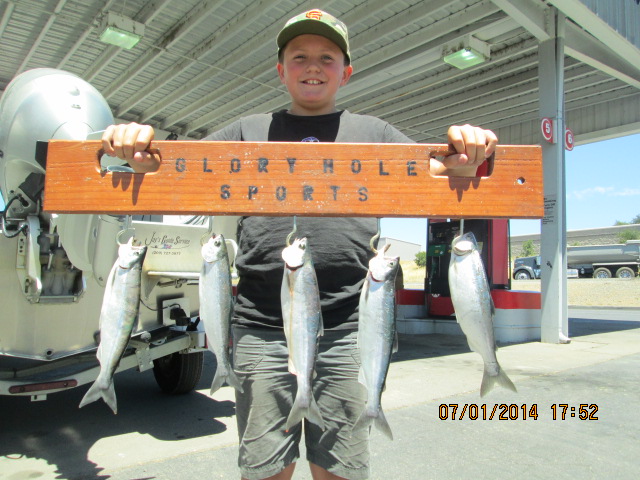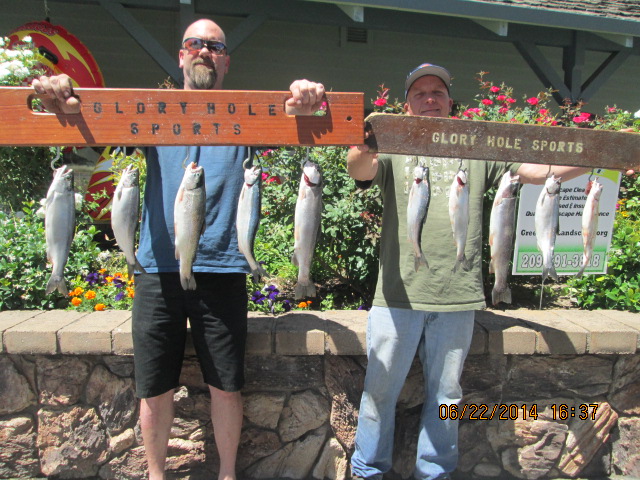Nor Cal Fish Report
New Melones Reservoir Fish Report for 7-7-2014
New Melones Reservoir Fish Report for 7-7-2014
New Melones Reservoir Fish Report
New Melones Reservoir - Angels Camp, CA

by Glory Hole Sports Staff
7-7-2014
(209) 736-4333
Website
Water Conditions: New Melones Lake is currently holding 694,364 acre-feet of water. The lake level dropped four feet this week and is currently at 895 ft. above sea level and 190 ft. from full. The water is stained in most areas of the lake, and fairly clear in others. There are mud lines forming near the shore throughout the day, especially on windy days. The average water temperature is 74-80 degrees and rising daily.Tuttletown launch is closed. Glory Hole Point boat launch is open, and there are no plans to close it. There will be some transition periods between launches where launching will be limited to one or two lanes.
Trout: Fair. The trout are roaming the main lake near deeper/cooler water looking for balls of shad. Anglers should try fishing close to the surface in the early morning and evening and dropping to 40-60' during the day. Night fishing anglers are catching limits of fat healthy trout under a submersible light. Try anchoring the boat in 25-50' of water, and dropping the light 15-25' feet down. Be patient, it may take awhile for the light to attract plankton, baitfish, and trout. To catch them, try using live minnows, mini jigs, Power Bait, and crawlers. Trolling anglers should target trout in the main lake, near deep water. The trout are feed on 2-4" shad. Try using baits that match the size, profile and color of the baitfish. Rapala Shad Raps, Scatter Raps, Rattle traps, and Jointed Shad Raps are a very close match to the natural forage. Another way to get a few more bites is to add scent to your lures. Pro Cure gel in shad scent, or threadfin shad scent will do the trick. Don't forget to bring some crawlers. A single crawler threaded on the hook fished behind a single gold or silver blade is a great way to pick up a few fish. Bank anglers should try using a bubble and a fly rig in the mornings and evenings. Or soak some night crawlers and Power Bait midday. Also, try fishing some other local lakes and streams. Fly Fisherman, head to rivers, streams, and creeks. Try using nymphs and buggers midday. Switch a dry fly for some evening surface activity.
Kokanee: Good. The fish are starting to move a little deeper, from 40-60' is a good range to target them. Anglers have been reporting a good bite throughout the day. Once you locate a school of fish it is a good idea to stay in the area to catch your limit. The average size is a chunky 11-13" with a few fish measuring 14-16". The fish are schooling in deep water off of Glory Hole Point and near the dam, spillway and Rose Island. A variety of colors are producing limits. Darker colors do work best in deeper water. Try using baits that have a large profile such as Rocky Mountain Super Squids, or Apex. Larger blades will disperse more water which will help attract fish when there is little visibility. It is also a good idea to modify your dodgers by adding a little bend to them. This modification will give the blade and bait more side-to-side swing. Add a Scent Chamber/chain swivel to ensure your setup will have plenty of scent. Garlic, bloody tuna, anise, and kokanee special will work. Don't forget to tip your presentations with dyed and scented shoepeg corn.
Bass: Fair. The bass are in a summer pattern where they will move shallow at night and in the morning for a short period of time to feed. Then they will head back to cool water for the hot hours of the day. There is a short window off opportunity to catch some topwater fish but this style of fishing will produce some of the larger fish. Once the sun come up it is best to switch to slower moving sub-surface baits. Try dragging a Carolina Rig near deep water or, shaking a Texas Rig near some wood. The shad have been schooled up and in deep water. If you can locate the shad there should be some bass nearby. Please practice catch and release. Take photos and carefully release the fish back into to the lake to maintain a healthy fish population for generations to come.
Catfish: Good. Some big cats are showing up in shallow water. Melones catfish tend to be fish-eaters rather than bottom foragers, so use live minnows, frozen shad, mackerel, or anchovies for best success. Also while bait fishing, it is a good idea to drag your bait across the bottom every few minutes to attract nearby fish. Use a sliding sinker with a bead to create a ticking noise as your bait is moving. In dark water and murky water it is a good idea to add extra scent to your bait. Catfish hunt by sound/vibration and smell. Try using a couple rods to offer the fish a variety of baits. Also, large baits and large portions of bait will temp the monster catfish.
Crappie: Slow. It is best to fish at night with a submersible light. Try a live minnow in tandem with a mini jig. The color of the jig will draw fish to it, and the live minnow triggers the bite.
Trout: Fair. The trout are roaming the main lake near deeper/cooler water looking for balls of shad. Anglers should try fishing close to the surface in the early morning and evening and dropping to 40-60' during the day. Night fishing anglers are catching limits of fat healthy trout under a submersible light. Try anchoring the boat in 25-50' of water, and dropping the light 15-25' feet down. Be patient, it may take awhile for the light to attract plankton, baitfish, and trout. To catch them, try using live minnows, mini jigs, Power Bait, and crawlers. Trolling anglers should target trout in the main lake, near deep water. The trout are feed on 2-4" shad. Try using baits that match the size, profile and color of the baitfish. Rapala Shad Raps, Scatter Raps, Rattle traps, and Jointed Shad Raps are a very close match to the natural forage. Another way to get a few more bites is to add scent to your lures. Pro Cure gel in shad scent, or threadfin shad scent will do the trick. Don't forget to bring some crawlers. A single crawler threaded on the hook fished behind a single gold or silver blade is a great way to pick up a few fish. Bank anglers should try using a bubble and a fly rig in the mornings and evenings. Or soak some night crawlers and Power Bait midday. Also, try fishing some other local lakes and streams. Fly Fisherman, head to rivers, streams, and creeks. Try using nymphs and buggers midday. Switch a dry fly for some evening surface activity.
Kokanee: Good. The fish are starting to move a little deeper, from 40-60' is a good range to target them. Anglers have been reporting a good bite throughout the day. Once you locate a school of fish it is a good idea to stay in the area to catch your limit. The average size is a chunky 11-13" with a few fish measuring 14-16". The fish are schooling in deep water off of Glory Hole Point and near the dam, spillway and Rose Island. A variety of colors are producing limits. Darker colors do work best in deeper water. Try using baits that have a large profile such as Rocky Mountain Super Squids, or Apex. Larger blades will disperse more water which will help attract fish when there is little visibility. It is also a good idea to modify your dodgers by adding a little bend to them. This modification will give the blade and bait more side-to-side swing. Add a Scent Chamber/chain swivel to ensure your setup will have plenty of scent. Garlic, bloody tuna, anise, and kokanee special will work. Don't forget to tip your presentations with dyed and scented shoepeg corn.
Bass: Fair. The bass are in a summer pattern where they will move shallow at night and in the morning for a short period of time to feed. Then they will head back to cool water for the hot hours of the day. There is a short window off opportunity to catch some topwater fish but this style of fishing will produce some of the larger fish. Once the sun come up it is best to switch to slower moving sub-surface baits. Try dragging a Carolina Rig near deep water or, shaking a Texas Rig near some wood. The shad have been schooled up and in deep water. If you can locate the shad there should be some bass nearby. Please practice catch and release. Take photos and carefully release the fish back into to the lake to maintain a healthy fish population for generations to come.
Catfish: Good. Some big cats are showing up in shallow water. Melones catfish tend to be fish-eaters rather than bottom foragers, so use live minnows, frozen shad, mackerel, or anchovies for best success. Also while bait fishing, it is a good idea to drag your bait across the bottom every few minutes to attract nearby fish. Use a sliding sinker with a bead to create a ticking noise as your bait is moving. In dark water and murky water it is a good idea to add extra scent to your bait. Catfish hunt by sound/vibration and smell. Try using a couple rods to offer the fish a variety of baits. Also, large baits and large portions of bait will temp the monster catfish.
Crappie: Slow. It is best to fish at night with a submersible light. Try a live minnow in tandem with a mini jig. The color of the jig will draw fish to it, and the live minnow triggers the bite.
Photos
< Previous Report Next Report >
< Previous Report Next Report >
More Reports
New Melones Reservoir Fish Report
New Melones Reservoir
6-30-2014
Water Conditions: New Melones Lake is currently holding 717,442 acre-feet of water. The lake level dropped four feet...... Read More
New Melones Reservoir Fish Report
New Melones Reservoir
6-23-2014
Water Conditions: New Melones Lake is currently holding 739,507 acre-feet of water. The lake level dropped three feet...... Read More

www.NorCalFishReports.com © 2024. All Rights Reserved.
Website Hosting and Design provided by TECK.net
Website Hosting and Design provided by TECK.net
